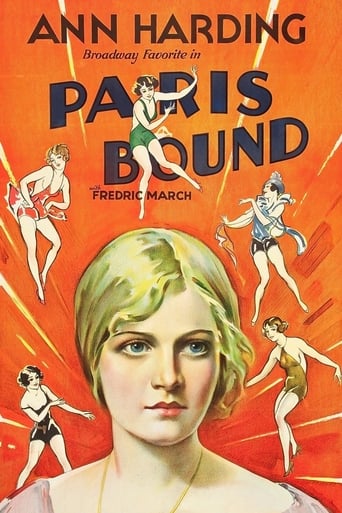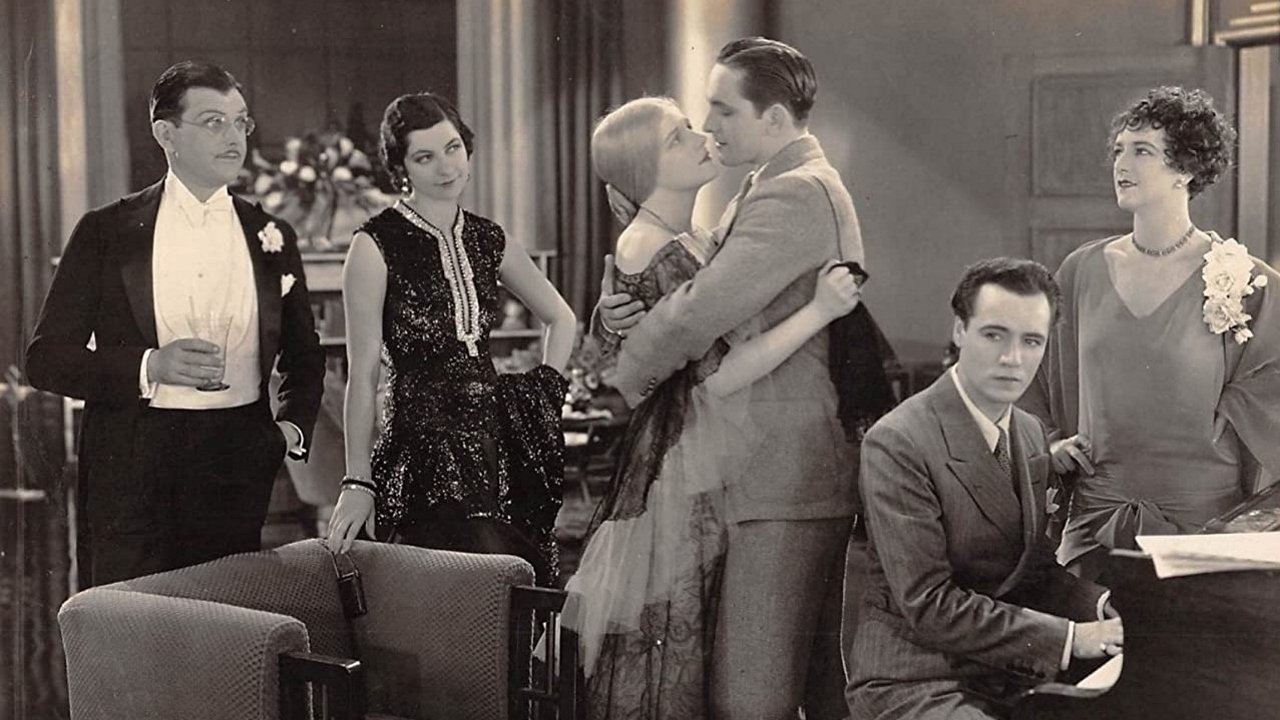JohnHowardReid
Thanks to the efforts of Gary Lacher who found and repaired a 16mm print, this is no longer a lost film. Alas, it's no lost masterpiece either. In fact, as we might expect from an early talkie, it's all talk, talk, talk and little, little action. But Ann Harding gives a competent performance and the other players, with one exception, are also up to scratch. The exception, oddly enough, is Fredric March, here making his eighth movie appearance, and his third sound film. His is a vital character, but March seems to be playing the role as if he were just discovering movies for the first time in his career. His performance is hesitant, to say the least. Admittedly, director Edward H. Griffith is of no help. He certainly gives Ann Harding the best camera angles, but March doesn't fight back. He seems both intimidated and so overawed that he's content to stay in the shadows, as it were. Just look at the posters reproduced on the Grapevine DVD. At first sight, the cover reproduction of the original 1929 poster does not feature March at all. Ann Harding takes up at least half the poster and her name is right up there in big, big letters. But with the aid of a magnifying glass, you can just make out the name of Fredric March, buried under the leg of some sexy chorus cutie!
MartinHafer
"Paris Bound" is clearly a Pre-code film with its strange moral sensibilities and it probably will shock most viewers today. However, I also found that the film's message was bizarre and confusing to say the least.When the film begins, Jim (Frederic March and Mary (Ann Harding in her first film) are getting married. On the day of the wedding, Mary has a strange talk with Jim--almost like she is suggesting an open marriage where each can sleep with whomever they like. Later, it seems more like she really, perhaps, intended to say they both could have their own lives and friends of the opposite sex...which is, practically speaking, an invitation to have an open marriage. Well, Jim is the nice and dutiful husband...for a few years. Unfortunately, Nora is a real 'modern girl' and offers to become his mistress.In the meantime, you see some weird interludes with Jim's parents. They are divorced and the father blames it all on his wife! He admits to having had affairs but that, to him, seems hardly a reason to end the marriage as these ladies meant nothing to him(??). So, SHE is painted as the unreasonable person. Later, this man advises Mary to take his attitude...and when Mary learns that Jim might have a mistress, she ponders sleeping with her best friend, a man she often hangs out with when Jim is off on business trips.Does all this sound odd and confusing? Well, wait until you see the ending...and then you'll most likely wonder what the film was all about and what messages it was trying to convey. I know that it's NOT a great film if you want to give newlyweds some healthy marital advice!So is it any good? Well, I think Harding sometime overacted. March was fine even if his character seemed detestable. Overall, however, the film came off as a bit stagy and unsatisfying. It's also the sort of amoral film that the studios would abandon once the new Production Code was put into effect in mid-1934.
roslein-674-874556
Slow and stilted, this film is obviously the adaptation of a play--all the action takes place (or could) in one room. The director shows his tin ear (and whatever is the visual equivalent) by starting the movie with Ann Harding and Fredric March going through the wedding service, which goes on and on and on. The two attractive leads, both highly accomplished actors, are the reason for seeing this, as are such distinctly period touches as his saying to her "Take a deep breath" and handing her a cigarette. Ilka Chase also makes two brief, welcome appearances as a fashionable, flippant socialite. But the plot is minuscule and is also well past its use-by date--we're told that a good wife overlooks a husband's affairs if he really loves her and the other women mean nothing to him. And how does she know he feels that way? Because he says so!
ecaulfield
The movie begins with the wedding of Mary (Ann Harding) and Jim (Fredric March). They will be a quite happy couple. Their wedding vows are terribly solemn. It turns out that that dedication won't be the only reason for their bliss.After the ceremony, the couple's female 'friend,' Noel, is distraught because she will never give up pining for Jim. Jim reluctantly obliges Mary's request that he try to assuage Noel before they alight on their honeymoon. It appears second nature for Mary to consider another woman's feelings at a time when she could be feeling the euphoria of marrying the man she treasures. The woman Mary sends Jim off to comfort is not a retiring flower. Noel revels in self-pity over her unrequited love, telling Jim, 'I know you kiss me every time you see me
what does it matter if you haven't done it as long as you're thinking of it? You can't be indifferent to me so don't try.' Later, Mary tells Noel that she and Jim both love Noel. That is the thing about Mary – she has the right touch. She had the wisdom to send Jim to Noel to try to calm her and the kindness to try to make Noel feel loved. Mary intends to be wise about her marriage, too. She and Jim are very wrapped up in each other. How desperately they want to be a 'success.' They must mingle with people often so that they won't long for some experience beyond each other: Mary: I don't like monopolies, at least not for you and me. Jim: Okay, but I'll like you best.The point is not to let other people become novelties (temptations). Richard admires Mary from afar. She once spent much time listening to and composing music with him. She tries to make him feel comfortable with her new status, calling herself an old married woman and telling him that she expects that he visit her and work in her new music room.Mary determines to be self-disciplined each year as publisher Jim goes to Paris to meet authors. She never goes with him. 'What about my child?' is one of her excuses. But she can hardly bear even to see Jim off at the ship so much does his absence hurt her. 'Heavens yes,' she would like to go with him, but 'I have the notion that married people need a holiday from each other.' So as for spending six weeks in Paris with him she says, 'I just never do.' Mary is filled with exemplary traits: She has the charm of being well-spoken. To 'How's your baby?' she quips, 'Come out tomorrow and I'll hold a one man exhibit.' And no one could be more discreet. When her friend asks her why she didn't come to visit when she was with Jim in Paris the previous year, Mary realizes that she has been mistaken for the 'other woman' Jim was really with, and calmly replies, 'It was the shortest kind of a trip.'One is left to wonder if the thesis of the film is that infidelity doesn't matter because in truth it doesn't even matter to the person committing it. A wanderer is compelled by physical stirrings beyond his or her control almost as if s/he were an innocent bystander to chemistry.Two scenes in the film bring this theme to light. Jim's divorced parents have a curious conversation:Father: You made a failure of your marriage. I may have committed infidelity but you committed divorce. You did me out of my marriage and home. You destroyed a spiritual relationship that belonged only to us. Jim is a lot like me. Mother: Then I pity Mary.The father repeats this line of reasoning when Mary discovers that Jim may have been unfaithful.Mary: I don't feel compelled to share him. Father: What has this one misstep got to do with you? I doubt if you've shared anything. Mary: I'm insulted. He couldn't love me and go with her.Has Mary never had any 'stirrings' for anyone else in all the years she has been married to Jim? Never, she says. He wishes she had so that she would know it's possible.Richard is writing the music for a ballet. He can't finish it. Mary tells him he'll never finish anything. Richard believes that the unfinished ballet represents Mary's unfulfilled relationship with him. She never finishes anything either, i.e. her self-discipline toward her marriage leads her to repress her feelings.Is the film trying to say not only that such attractions are inevitable but that acting on them may also be unavoidable at times? Because, you see, the next thing Mary knows, she has had a minor indiscretion of her own.Father's point seems to be that chemical attraction is a small thing that one is powerless to control and that when one acts on it, one is not sharing anything that is really of value to one's spouse. Perhaps Mary's experience with Richard teaches her this.Mary tries to be honest with Jim:Jim: I'm not certain I want to hear it. I'm certain I don't want to hear it. I don't ever want to hear any bad news.He suspects Mary wants to tell him of her weak moment with Richard. He knows only that he wants to keep alive the truly affectionate love they have shared. He has no double standard. In rejecting this 'news,' Jim is not only excusing his own actions but excusing Mary's transgressions, if she has made any.Neither lets pride destroy the unique romantic married relationship they have. Spontaneously, they set off at 2 a.m. to see their little son. Jim loves to see him when he's asleep.Jim: Have you forgotten anything? Mary: Only my dignity. Jim: That's not anything.


 AD
AD


